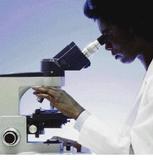
Petrina Francis, Staff Reporter
THE SHORTAGE of medical technologists in the public health system across the island is causing serious backlogs of tests in laboratories and putting patients' health at risk.
As a result of the shortage, some patients are not able to get the treatment that is needed on time, causing, for example, a six-month wait by some women who do Pap smear tests.
This is according to Leeford Bennett, chief medical technologist at the Comprehensive Health Clinic in Kingston.
Currently, there are 108 medical technologists in the public system across the island.
"It is a serious shortage we are experiencing," Mr. Bennett recently told The Sunday Gleaner. He said that the system would begin to function effectively when the complement of technologists reaches about 200.
According to Mr. Bennett, the two main areas of the profession which are severely affected are hystology (which deals with tissues) and cytology (which deals with cells such as Pap smear tests).
Delay in returning these test results, he said, can affect patient care. For example, if a woman who has cervical cancer was able to find out earlier about her condition, early treatment could prevent the disease from spreading and, therefore, save her life.
Apart from assisting physicians in the effective care and management of patients who are ill, the work of medical technologists supports and enables other critical areas of public health such as the detection and surveillance of diseases outbreaks; the emergence of drug-resistant organisms; provision of epidemiological data to inform health education and policy planning, and the assessment of risk to chronic diseases.
"Our work is very, very important and encompasses several different disciplines," said Norman Burke, chief medical technologist at the National Public Health Laboratories. He noted, for example, that only laboratory tests can prove that a person has HIV.
On Friday, The Sunday Gleaner visited the National Public Health Laboratories in Kingston. As we walked through the hystology and cytology departments, it was obvious that there was indeed a severe shortage. The Sunday Gleaner witnessed piles and piles of patients' samples waiting to be examined by medical technologists.
Mr. Bennett noted that there should be about 70 or more medical technologists on staff at the National Public Health Laboratories, but there were only 46. He explained that a 24-hour emergency service is offered and medical technologists have to be rostered to facilitate the different shifts. The chief medical technologist said ideally, there should be about 140 or even 200 persons to run the system. As a result of this, medical technologists, he said are burnt out because they are forced to work extra hours.
Mr. Bennett further noted that the shortage of medical technologists and lack of resources are preventing the public system from carrying out certain tests. As a result of this, he said doctors have to send patients to private laboratories to get tests such as prostate specific antigen (PSA), (used to detect prostate cancer).
A further problem he highlighted, was that Government pays medical technologists a meagre sum of money (about $477,000 per annum) and as a result of this they tend to gravitate more towards the private labs, which pay them about $600,000.
MIGRATE
And medical technologists migrate just like doctors, nurses and teachers do. Most of them, Mr. Bennett said, migrate to The Cayman Islands, The Bahamas and The United States of America.
The chief medical technologist told The Sunday Gleaner that about 35 medical technologists graduate from the University of Technology (UTech) and The Northern Caribbean University (NCU) each year. But the public system is lucky if it gets one or two of those graduates. He also pointed out that it takes about five months before medical technologists are hired because the Ministry of Health has to get 'clearance' from the Ministry of Finance.

